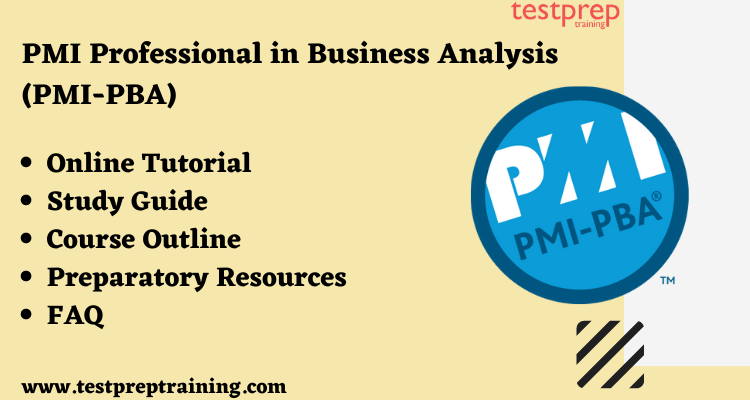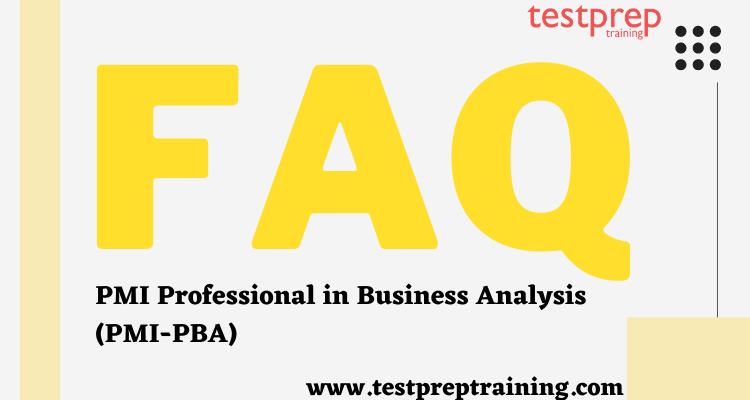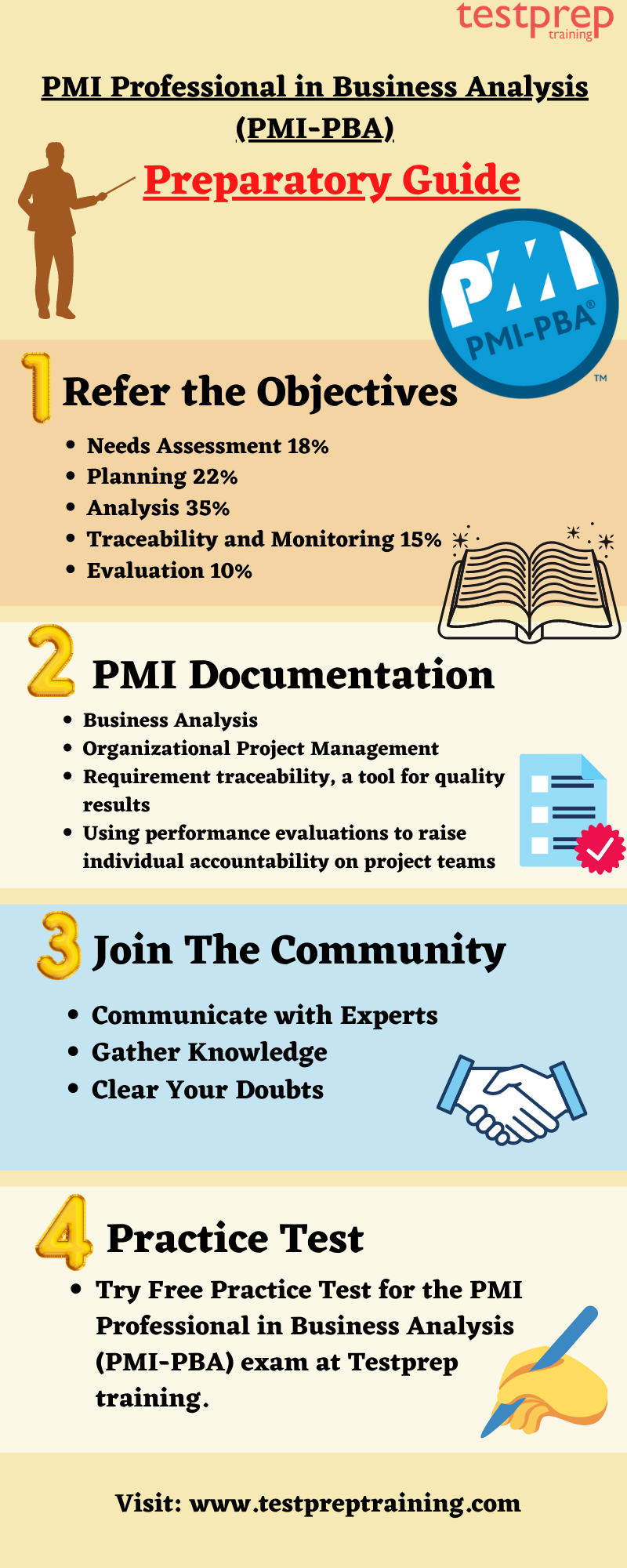PMI Professional in Business Analysis (PMI-PBA)
Business analysis has grown a competency of crucial significance to project management. Becoming accredited as a business analysis (BA) expert can move the candidate’s profession in a fresh direction while possibilities for BAs are on the rise. The PMI Professional In Business Analysis (PMI-PBA)® Certification acknowledges an individual’s expertise in business analysis and utilizing these tools and techniques to enhance the overall progress of projects. In addition, the PMI Professional in Business Analysis (PMI-PBA) certification carries a high level of professional credibility. It needs a combination of business analysis training, experience working on projects, and examination of business analysis principles, practices, tools, and techniques. This global certification also supports individuals in meeting the needs of organizations that rely on business analysis practitioners to play key roles on their teams.
Who should take this exam?
If the candidate works with project teams and manages requirements or product development, or if they are a project or program manager who performs business analysis in their role, then the PMI Professional in Business Analysis (PMI-PBA) certification is the right choice for them.
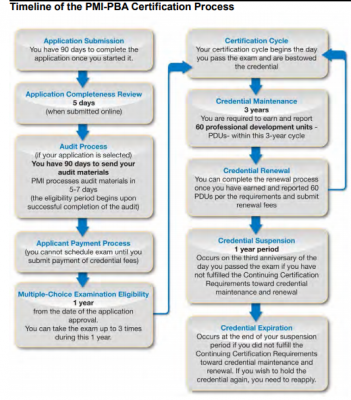
Learning Objectives
The candidates should know the objectives for the PMI Professional in Business Analysis (PMI-PBA) in order to prepare for it. The candidate can download the exam guide from the official website of PMI. The objectives for PMI Professional in Business Analysis (PMI-PBA) are:
- Domain 1. Needs Assessment 18%
- Domain 2. Planning 22%
- Domain 3. Analysis 35%
- Domain 4. Traceability and Monitoring 15%
- Domain 5. Evaluation 10%
Learning Path
PMI allows a complete certification program for practitioners with many various levels of education and experience. There are currently eight certifications which are developed and maintained through a vigorous process.
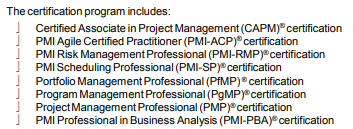
Exam Details
The PMI-PBA examination is a necessary part of the activities commencing to obtaining a professional credential, thus it is important that the PMI-PBA examination truly reflect the practices of the business analysis professional. All the PMI PBA Test Questions have been written and widely reviewed by qualified business analysis professionals and are backed by current business analysis published references. The certification exam has 200 multiple-choice questions and it gives 4hours to complete the exam. The examination fee for the Members is US$405.00 and Non-members are US$555.00.


Requirements
The PMI PBA Certification Requirements are:
- Secondary degree (high school diploma, associate’s degree
- Business analysis experience
- Education in business analysis
- Bachelor’s degree or the global equivalent
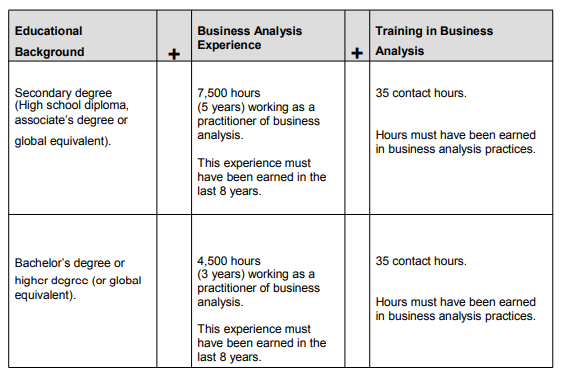
PMI Professional in Business Analysis (PMI-PBA) Interview Questions
Let us look at some PMI Professional in Business Analysis (PMI-PBA) interview questions.

PMI Professional In Business Analysis (PMI-PBA)® Course Outline
PMI has divided the syllabus into various sections. The PMI Professional in Business Analysis (PMI-PBA) exam includes its objectives and sub-topics in it. The detailed course outline is mentioned below:
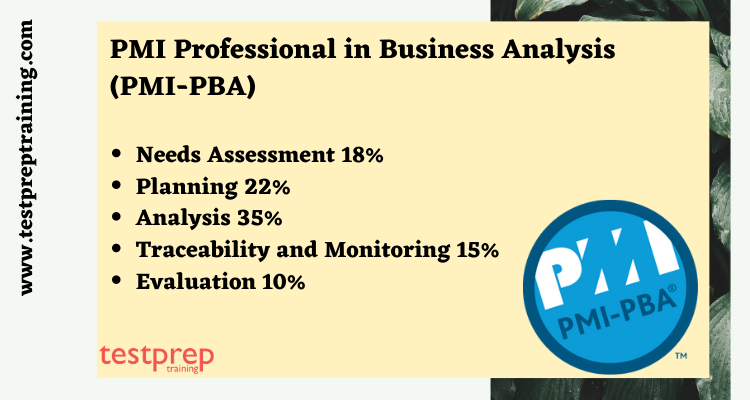
Domain 1: Needs Assessment
- Define or review a business problem or opportunity using problem and opportunity analysis techniques in order to develop a solution scope statement and/or to provide input to create a business case.
- Collect and analyze information from a variety of sources using valuation tools and techniques to contribute to determining the value proposition of the initiative.
- Collaborate in the development of project goals and objectives by providing clarification of business needs and solution scope in order to align the product with the organization’s goals and objectives.
- Identify stakeholders by reviewing goals, objectives, and requirements in order that the appropriate parties are represented, informed and involved.
- Determine stakeholder values regarding the product, using elicitation techniques in order to provide a baseline for prioritizing requirements.
PMI Documentation: Business Analysis
Domain 2: Planning
- Review the business case, and the project goals and objectives, in order to provide context for business analysis activities.
- Define strategy for requirements traceability using traceability tools and techniques in order to establish the level of traceability necessary to monitor and validate the requirements.
- Develop requirements management plan by identifying stakeholders, roles and responsibilities, communication protocols, and methods for eliciting, analyzing, documenting, managing, and approving requirements in order to establish a roadmap for delivering the expected solution.
- Select methods for requirements change control by identifying channels for communicating requests and processes for managing changes in order to establish standard protocols for incorporation into the change management plan.
- Select methods for document control by using documentation management tools and techniques in order to establish a standard for requirements traceability and versioning.
- Define business metrics and acceptance criteria by collaborating with stakeholders for use in evaluating when the solution meets the requirements.
PMI Documentation: Organizational Project Management
Domain 3: Analysis
- Elicit or identify requirements, using individual and group elicitation techniques in order to discover and capture requirements with supporting details (e.g., origin and rationale).
- Analyze, decompose, and elaborate requirements using techniques such as dependency analysis, interface analysis, and data and process modelling in order to collaboratively uncover and clarify product options and capabilities.
- Evaluate product options and capabilities by using decision-making and valuation techniques in order to determine which requirements are accepted, deferred, or rejected.
- Allocate accepted or deferred requirements by balancing scope schedule, budget, and resource constraints with the value proposition using prioritization, dependency analysis, and decision-making tools and techniques in order to create a requirements baseline.
- Obtain sign-off on requirements baseline using decision-making techniques in order to facilitate stakeholder consensus and achieve stakeholder approval.
- Write requirements specifications using processes (such as use cases, user stories), data, and interface details in order to communicate requirements that are measurable and actionable (that is, suitable for development).
- Validate requirements using tools and techniques such as documentation review, prototypes, demos, and other validation methods in order to ensure requirements are complete, accurate and aligned with goals, objectives, and value proposition.
- Elaborate and specify detailed metrics and acceptance criteria using measurement tools and techniques for use in evaluating whether the solution meets requirements.
PMI Documentation: Business Analysis
Domain 4: Traceability and Monitoring
- Track requirements using a traceability artifact or tools, capturing the requirements’ status, sources and relationships (including dependencies), in order to provide evidence that the requirements are delivered as stated.
- Monitor requirements throughout their life cycles using a traceability artifact or tool in order to ensure the appropriate supporting requirements artifacts (such as models, documentation, and test cases) are produced, reviewed and approved at each point in the life cycle.
- Update a requirement’s status as it moves through its lifecycle states by communicating with appropriate stakeholders and recording changes in the traceability artifact or tool in order to track requirements towards closure.
- Communicate requirements status to project manager and other stakeholders using communication methods in order to keep them informed of requirements issues, conflicts, changes, risks, and overall status.
- Manage changes to requirements by assessing impacts, dependencies, and risks in accordance with the change control plan, and comparing to the requirements.
- The baseline in order to maintain the integrity of the requirements and associated artifacts.
PMI Documentation: Requirement traceability, a tool for quality results
Domain 5: Evaluation
- Validate the solution’s test results, reports, and other test evidence against the requirements acceptance criteria in order to determine whether the solution satisfies the requirements.
- Analyze and communicate the solution’s identified gaps and deltas using quality assurance tools and methods in order to enable stakeholders to resolve discrepancies between solution scope, requirements, and developed solution.
- Obtain stakeholder sign-off on the developed solution using decision-making techniques in order to proceed with deployment.
- Evaluate the deployed solution using valuation techniques in order to determine how well the solution meets the business case and value proposition.
PMI Documentation: Using performance evaluations to raise individual accountability on project teams
Exam Policies
The candidate should go through the policies of the PMI for their PMI PBA Preparation. The terms and policies are present on the official site of the PMI. The terms and policies include scope of the agreement, definitions, ownership and use of PMI intellectual property, links, message boards, chat boards, blogs, virtual communities, and other interactive media, copyright compliance and complaints, etc.
PMI Professional in Business Analysis (PMI-PBA) FAQ
PMI Professional in Business Analysis PMI PBA Study Guide
The preparation steps which are essential in order to successfully pass the PMI Professional in Business Analysis (PMI-PBA) exam are:
PMI Official Website
Visiting the PMI official website is a necessary step while preparing for the PMI Professional in Business Analysis (PMI-PBA) exam. The official site proposes a lot of information and sources which is very important in preparing for the exam. The resources such as study guide, sample papers, whitepapers, documentation, faqs, etc. The candidate can find all such important things on the official page.
PMI PBA Certification Online Training and Online Courses
The candidate can also opt for the PMI training programs and online courses. The PMI offers training programs on every exam. The training programs for a particular exam contain all information of the exam such as description, intended audience, delivery method, duration etc. The candidate should join a training program to gain knowledge and skills for PMI Professional in Business Analysis (PMI-PBA).
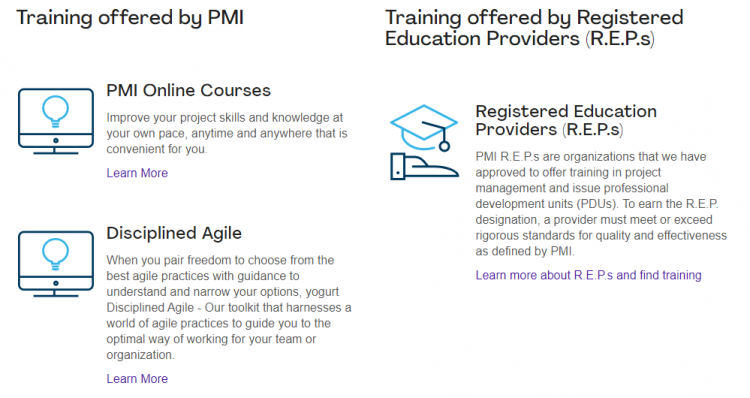
Whitepapers, Books and Guides
The next step in the preparatory guide should be whitepapers, books and study guides. The candidate needs to find those books which are enriched with information. Finding a good book may be a difficult task, but in order to gather the knowledge and skills, the candidate has to find, read and understand. Here, are some PMI PBA Reference Books you must consider:
- The PMI Guide to Business Analysis Paperback by Project Management Institute.
- Business Analysis for Practitioners: A Practice Guide Paperback by Project Management Institute
- Achieve Business Analysis Certification: A Concise Guide to PMI-PBA®, CBAP® and CPRE Exam Success Pap/Psc Edition, by Klaus Nielsen
Practice Test
Practice tests are the one which guarantees the candidate about their preparation. The PMI PBA Practice Test will assist the candidates to acknowledge their weak areas so that they can work on them. There are many practice tests available on the internet nowadays, so the candidate can choose which they want.
Join a Study Group
Joining a group study will also be helpful for the candidate. It will encourage them to do more hard work. Also, studying in the group will help them to stay connected with the other people who are on the same pathway as them. Also, the discussion of such study groups will benefit the students in their exam.

